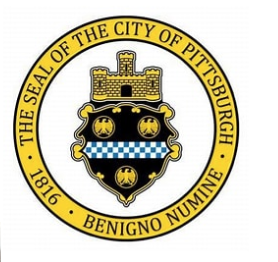
Location: Pittsburgh, Pennsylvania
Fleet type: Light-duty electric vehicles
Narrative: The City of Pittsburgh first became involved with Pittsburgh Region Clean Cities at a 2014 National Drive Electric Week Event held at the Carnegie Mellon University Electric Car Garage where they delivered a proclamation to the City Captain at a National Drive Electric Week event.
In 2018, PRCC helped the City put together an EV Task Force to provide recommendations on why the City should look at electric vehicles for their fleet. The City has since committed to moving its entire fleet to electric by 2030. (See also Climate Action Plan 3.0 - YouTube and Climate Action Plan | pittsburghpa.gov.)
The Pittsburgh Coalition (PRCC) began working with the City of Pittsburgh and its Fleet Services Director in 2014 to consider and evaluate multiple alternative fuels. In 2015, the City began looking more carefully at acquiring light-duty (LD) electric vehicles (EVs). Then, working with many of their divisions, the City started to purchase their first electric vehicles in 2017, including two Ford Focuses and then two Chevy Bolts.
The City had the largest fleet of electric vehicles(26) in western Pennsylvania in 2021, and as of the end of 2022, that fleet has increased to 88 electric vehicles (not including an additional 113 hybrid electric vehicles). The City has additional electric vehicles on order including their first 8 electric trash Haulers.
In 2016, PRCC had a Pennsylvania Alternative Fuels Incentive Grant (AFIG) to install Level II Chargers all over the Southwestern Pennsylvania area. A couple of chargers were donated to the Pittsburgh Parking Authority who installed them in a garage that the City of Pittsburgh uses for many of their vehicles. In fact, the City installed an additional eleven chargers after the initial donation. Since then, the City has moved to the Second Avenue parking lot where they installed 15 dual plugs (30 ports) at that location. In addition, the City has since installed a DC Fast Charger at a parking area in the East Liberty location.
The City has been a stakeholder with the Pittsburgh Region Clean Cities since its inception in 1995 and proves that alternative fuels and technologies are what many cities across the US can be doing to become more sustainable. The City plans to move all its departments over to zero emissions as soon as the vehicles become available. The City of Pittsburgh’s new mayor continues to support the Climate Action Plan.
Outputs & Outcomes: The outputs from the City’s plan have greatly reduced their greenhouse
gas (GHG’s) emissions by over 53.2 short tons in 2022 according to the AFLEET on-line tool. Buying electric vehicles also reduced the use of petroleum and clearly reduced maintenance costs.
The outcomes from this work span several layers:
The GHG emission reductions were over 53.2 short tons (and depends on the fuel economy of the vehicle that it replaced).
This achievement helps the City show the community that by using electric vehicles for transportation and working towards their climate reduction goals, they are making changes that benefit all residents of the City.
More community citizens and visitors to the area are now able to see EVs at work around the City.
The City, Pittsburgh Region Clean Cities, Duquesne Light Company (the local utility); and the 3 Rivers EV Association (our local EV chapter) work together on publicizing information about EVs, which in turn educates more citizens about the benefits of EVs while breaking through perceived barriers in the minds of potential EV owners.
Best Practices & Lessons Learned: The City has been a partner with Pittsburgh Region Clean Cities as part of some of this work and helping educate more of its residents about the use of electric vehicles. In fact, the City is part of CONNECT (The Congress of Neighboring Communities) a group of municipali
ties that are all working to move to electric vehicles to meet climate action and sustainability goals. Many of these communities have already installed and/or purchased electric vehicles for the fleets.













Comments